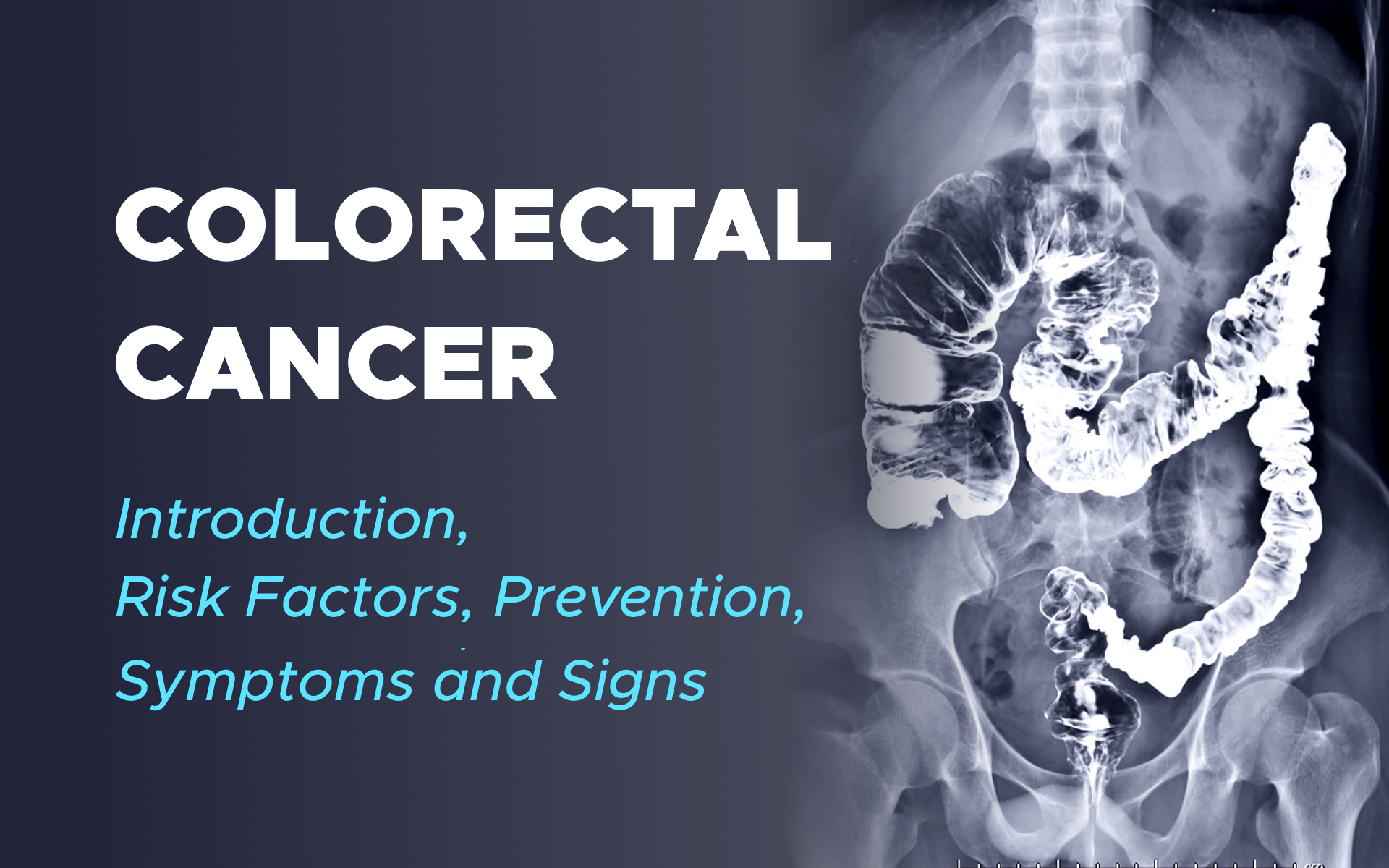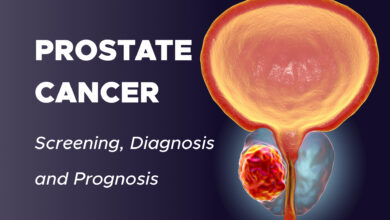
Colorectal Cancer
Colorectal cancer is the third most common cancer diagnosed in both men and women each year in the United States, excluding skin cancer. The probability of suffering from colorectal cancer is about 4%–5% and the risk for developing colorectal cancer is associated with personal features or habits such as age, chronic disease history and lifestyle. The environmental and genetic factors that cause colorectal cancer do so by promoting the acquisition of hallmark behaviours of cancer in colon epithelial cells.
Colorectal cancer begins when healthy cells in the lining of the colon or rectum change and grow out of control, forming a mass called a tumor. A tumor can be cancerous or benign. A cancerous tumor is malignant, meaning it can grow and spread to other parts of the body.
A benign tumor means the tumor can grow but will not spread. These changes usually take years to develop. Both genetic and environmental factors can cause the changes. However, when a person has an uncommon inherited syndrome, changes can occur in months or years.
Anatomy of the Colon and Rectum
The colon and rectum make up the large intestine, which plays an important role in the body’s ability to process waste. The colon makes up the first 5 to 6 feet of the large intestine, and the rectum makes up the last 6 inches, ending at the anüs.
The colon and rectum have 5 sections. The ascending colon is the portion that extends from a pouch called the cecum. The cecum is the beginning of the large intestine into which the small intestine empties; it’s on the right side of the abdomen. The transverse colon crosses the top of the abdomen.
The descending colon takes waste down the left side. Finally, the sigmoid colon at the bottom takes waste a few more inches, down to the rectum. Waste leaves the body through the anus.
Colorectal Polyps
Colorectal cancer most often begins as a polyp, a noncancerous growth that may develop on the inner wall of the colon or rectum as people get older. If not treated or removed, a polyp can become a potentially life-threatening cancer. Finding and removing precancerous polyps can prevent colorectal cancer.
There are several forms of polyps. Adenomatous polyps, or adenomas, are growths that may become cancerous. They can be found with a colonoscopy. Polyps are most easily found during a colonoscopy because they usually bulge into the colon, forming a mound on the wall of the colon that can be found by the doctor.
About 10% of colon polyps are flat and hard to find with a colonoscopy unless a dye is used to highlight them. These flat polyps have a high risk of becoming cancerous, regardless of their size.
Hyperplastic polyps may also develop in the colon and rectum. They are not considered precancerous.
Types of Colorectal Cancer
Colorectal cancer can begin in either the colon or the rectum. Cancer that begins in the colon is called colon cancer. Cancer that begins in the rectum is called rectal cancer.
Most colon and rectal cancers are a type of tumor called adenocarcinoma, which is cancer of the cells that line the inside tissue of the colon and rectum. This section specifically covers adenocarcinoma. Other types of cancer that occur far less often but can begin in the colon or rectum include neuroendocrine tumor of the gastrointestinal tract, gastrointestinal stromal tumor (GIST), small cell carcinoma, and lymphoma.
Colorectal Cancer: Risk Factors and Prevention
A risk factor is anything that increases a person’s chance of developing cancer. Although risk factors often influence the development of cancer, most do not directly cause cancer. Some people with several risk factors never develop cancer, while others with no known risk factors do. Knowing your risk factors and talking about them with your doctor may help you make more informed lifestyle and health care choices.
A person with an average risk of colorectal cancer has about a 5% chance of developing colorectal cancer overall. Generally, most colorectal cancers (about 95%) are considered sporadic, meaning the genetic changes develop by chance after a person is born, so there is no risk of passing these genetic changes on to one’s children.
Inherited colorectal cancers are less common (about 5%) and occur when gene mutations, or changes, are passed within a family from 1 generation to the next. Often, the cause of colorectal cancer is not known. However, the following factors may raise a person’s risk of developing colorectal cancer:
The risk of colorectal cancer increases as people get older. Colorectal cancer can occur in young adults and teenagers, but the majority of colorectal cancers occur in people older than 50.
For colon cancer, the average age at the time of diagnosis for men is 68 and for women is 72. For rectal cancer, it is age 63 for both men and women. Older adults who are diagnosed with colorectal cancer face unique challenges, specifically with regard to cancer treatment.
It is important to note that while colorectal cancer is still diagnosed most commonly in older adults, the incidence rate for colorectal cancer declined by about 5% per year in adults 65 and older and decreased by 1.4% per year in adults 50 to 64 years old, based on the latest statistics.
Meanwhile, the incidence rate increased by nearly 2% per year in adults younger than 50. The increase is due in large part to rising numbers of rectal cancer. About 11% of all colorectal diagnoses are in people under age 50. The reason for this rise in younger adults is not well known and is an active area of research.
Gender:
Men have a slightly higher risk of developing colorectal cancer than women.
Family History of Colorectal Cancer:
Colorectal cancer may run in the family if first-degree relatives (parents, brothers, sisters, children) or many other family members (grandparents, aunts, uncles, nieces, nephews, grandchildren, cousins) have had colorectal cancer. This is especially true when family members are diagnosed with colorectal cancer before age 60.
If a person has a family history of colorectal cancer, his or her risk of developing the disease is nearly double. The risk further increases if other close relatives have also developed colorectal cancer or if a first-degree relative was diagnosed at a younger age
It is important to talk to your family members about your family’s history of colorectal cancer. If you think you may have a family history of colorectal cancer, talk with a genetic counselor first before you have any genetic testing. Only genetic testing can find out if you have a genetic mutation, and genetic counselors are trained to explain the risks and benefits of genetic testing.
Rare Inherited Conditions:
Members of families with certain uncommon inherited conditions also have a higher risk of colorectal cancer, as well as other types of cancer. These include:
- Familial adenomatous polyposis (FAP)
- Attenuated familial adenomatous polyposis (AFAP), a subtype of FAP
- Gardner syndrome,a subtype of FAP
- Juvenile polyposis syndrome (JPS)
- Lynch syndrome, also called hereditary nonpolyposis colorectal cancer (HNPCC)
- Muir-Torre syndrome, a subtype of Lynch Syndrome
- MYH-associated polyposis (MAP)
- Peutz-Jeghers syndrome (PJS)
- Turcot syndrome,a subtype of FAP and Lynch Syndrome
Inflammatory Bowel Disease (IBD):
People with IBD, such as ulcerative colitis or Crohn’s disease, may develop chronic inflammation of the large intestine. This increases the risk of colorectal cancer. IBD is not the same as irritable bowel syndrome (IBS). IBS does not increase your risk of colorectal cancer.
Adenomatous Polyps (Adenomas):
Polyps are not cancer, but some types of polyps called adenomas can develop into colorectal cancer over time. Polyps can often be completely removed using a tool during a colonoscopy, a test in which a doctor looks into the colon using a lighted tube after the patient has been sedated.
Polyp removal can prevent colorectal cancer. People who have had adenomas have a greater risk of additional polyps and of colorectal cancer, and they should have follow-up screening tests regularly.
Personal History of Certain Types of Cancer:
People with a personal history of colorectal cancer and women who have had ovarian cancer or uterine cancer are more likely to develop colorectal cancer.
Black people have the highest rates of sporadic, or non-hereditary, colorectal cancer in the United States. Colorectal cancer is also a leading cause of cancer-related death among black people. Black women are more likely to die from colorectal cancer than women from any other racial group, and black men are even more likely to die from colorectal cancer than black women.
The reasons for these differences are unclear. Because black people are more likely to be diagnosed with colorectal cancer at a younger age, the American College of Gastroenterology suggests that black people begin screening with colonoscopies at age 45. Earlier screening may find changes in the colon at a point when they are more easily treated.
Physical Inactivity and Obesity:
People who lead an inactive lifestyle, meaning no regular exercise and a lot of sitting, and people who are overweight or obese may have an increased risk of colorectal cancer.
Current research consistently links eating more red meat and processed meat to a higher risk of the disease. Other dietary factors have also been looked at to see if they affect the risk of developing colorectal cancer.
Recent studies have shown that smokers are more likely to die from colorectal cancer than nonsmokers.
Prevention
Different factors cause different types of cancer. Researchers continue to look into what factors cause colorectal cancer, including ways to prevent it. Although there is no proven way to completely prevent this disease, you may be able to lower your risk.
The Following may Lower a Person’s Risk of Colorectal Cancer:
Aspirin and other Nonsteroidal Anti Inflammatory Drugs (NSAIDs):
Some studies suggest that aspirin and other NSAIDs may reduce the development of polyps in people with a history of colorectal cancer or polyps. However, regular use of NSAIDs may cause major side effects, including bleeding of the stomach lining and blood clots leading to stroke or heart attack.
Taking aspirin or other NSAIDs is not a substitute for having regular colorectal cancer screenings. People should talk with their doctor about the risks and benefits of taking aspirin on a regular basis.
Diet and Supplements:
A diet rich in fruits and vegetables and low in red meat may help reduce the risk of colorectal cancer. Some studies have also found that people who take calcium and vitamin D supplements have a lower risk of colorectal cancer.
Colorectal Cancer: Symptoms and Signs
It is important to remember that the symptoms and signs of colorectal cancer listed in this section are the same as those of extremely common conditions that are not cancer, such as hemorrhoids and IBS. When cancer is suspected, these symptoms usually have begun recently, are severe and long lasting, and change over time.
By being alert to the symptoms of colorectal cancer, it may be possible to detect the disease early, when it is most likely to be treated successfully. However, many people with colorectal cancer do not have any symptoms until the disease is advanced, so people need to be screened regularly.
People with colorectal cancer may experience the following symptoms or signs. As mentioned above, it is also possible that these changes may be caused by a medical condition that is not cancer, especially for the general symptoms of abdominal discomfort, bloating, and irregular bowel movements.
- A change in bowel habits
- Diarrhea, constipation, or feeling that the bowel does not empty completely
- Bright red or very dark blood in the stool
- Stools that look narrower or thinner than normal
- Discomfort in the abdomen, including frequent gas pains, bloating, fullness, and cramps
- Weight loss with no known explanation
- Constant tiredness or fatigue
- Unexplained iron-deficiency anemia, which is a low number of red blood cells
Talk with your doctor if any of these symptoms last for several weeks or become more severe. If you are concerned about any changes you experience, please talk with your doctor and ask to schedule a colonoscopy.
Because colorectal cancer can occur in people younger than the recommended screening age and in older people between screenings, anyone at any age who experiences these symptoms should visit a doctor to find out if they should have a colonoscopy.
If cancer is diagnosed, relieving symptoms remains an important part of cancer care and treatment. This may be called palliative care or supportive care. It is often started soon after diagnosis and continued throughout treatment. Be sure to talk with your health care team about the symptoms you experience, including any new symptoms or a change in symptoms.



